- Home
- Georgette Heyer
The Transformation of Philip Jettan Page 7
The Transformation of Philip Jettan Read online
Page 7
“A propos, Philippe. Your so dear friend has been talking about you!”
“Which so dear friend?” asked Philip. “Jules, if you maintain in the face of my exposition that Jeanne de Fontenay can rival la Salévier in the matter of—”
“But attend!” insisted the Vicomte. “The Englishman—the Bancroft—peste, what a name for my tongue!”
Philip broke off in the middle of his discourse. His eyes gleamed in the candlelight.
“Bancroft? What does he say of me?”
“A great deal, if all I hear is true.”
Philip set down his glass.
“Indeed! Now, what might you have heard, De Ravel?”
“It would appear that ce cher Bancroft feels no love for you, mon pauvre. If De Graune is to be believed, he resents your presence here. He says he has been deceived in you. It is all very sad.”
“Yes,” said Philip. He frowned. “Very sad. But what does he say?”
“He divulges your close-guarded secret,” said the Vicomte solemnly.
“Oh!” Philip turned in his chair and leaned his elbows on the table. “It is possible that I shall have a word to say to M. Bancroft. Continue, Charles!”
“He speaks of a lady in ‘Leetle Feeteldean’ who has blue, blue eyes, and—”
“Shall we pass over her eyes?” smiled Philip.
“But certainly! Her hair—”
“And her hair? In fact, shall we pass over all her attractions?”
“He is very much in love,” loudly whispered De Bergeret.
Philip flashed a smile at him.
“Very much, Jules. Proceed, Vicomte.”
The Vicomte sipped his wine.
“M. Bancroft, he told of your—ah—infatuation. He described the lady—oh, fully!”
The thin lips were growing into a straight, smiling line, tightly compressed. Philip nodded.
“Allons! Allons!”
“Vicomte, does the gossip of the gaming-hells amuse you?” asked Saint-Dantin sharply.
But the Vicomte was a mischief-loving soul. He disregarded the rebuke.
“A pretty piece, he called her, but no more than a simple country wench. By name—”
“Oh, have done!” exclaimed Saint-Dantin impatiently.
“But no!” Philip waved him aside. “I am very interested in what M’sieur has to say.”
“By name, Cléone. We have it from M. Bancroft that she falls in love with him for his beaux yeux and his so charming manner.”
“Ah!” Philip’s chin sank into his cupped palms. “Et puis?”
“It is further recorded that one M. Philippe Jettan importuned her with his clumsy attentions, so that M. Bancroft was compelled to teach this M. Philippe a sharp lesson. And when one asks, ‘What of the pretty Cléone?’ he shrugs his shoulders and replies, very superbly, that he wearied of her as of all others.”
Saint-Dantin’s crisp voice cut into the sudden silence.
“Philippe, fill your glass. Paul here tells me of a pass he conceived in his duel with Mardry last month. A—”
“I will ask Paul to show me that pass,” said Philip. He leaned back in his chair and laughed softly. A moment later he had resumed his interrupted discussion with De Bergeret.
Afterwards Saint-Dantin took him aside.
“Philippe, I would not have had that happen at my table! Charles is incorrigible!”
“On the contrary, I am grateful to him,” replied Philip. “I might not have heard else. Now I will shut that fellow’s mouth.”
“How?” asked Saint-Dantin blankly.
Philip made an imaginary pass in the air.
“Short of killing him,” objected Saint-Dantin, “I don’t see—”
“Kill him? Not I! I may count on you to—uphold me?”
“Of course. But what do you mean to do?”
“First I will reverse the tables. I will punish him. Then I will assure him that my friends will espouse my cause if he again mentions my lady’s name in public.”
Saint-Dantin nodded.
“I’ll vouch for those here to-night.”
“Wait! Any mention of her name will be reported to me, and I shall send François to administer a little beating. It is well.”
The Comte laughed outright.
“Oh, Philippe, thou art a young hot-head! Is this Cléone of so great account?”
Philip drew himself up.
“She is the lady whom I hope one day to make my wife.”
“Comment? Your wife? Ah, voyons! Cela change l’affaire! I did not know that. Stop his talk, by all means.”
“It’s what I am going to do,” said Philip. “Scélérat!”
“With a vile taste for pink, hein? You’ll call upon me?”
“If you please. And, I think, De Bergeret.”
“Saint-Dantin, a wager!” called De Vangrisse. “What are you talking of so earnestly?”
“Of pink coats,” answered Philip. “Oh, my rondeau! Where is it?”
“Devil take your rondeau!” cried the Vicomte. “Come and hazard a throw with me.”
“A l’instant!” Philip untied the ribbon about his rondeau and spread out the parchment. “I insist that you shall listen to this product of my brain!” He mounted a chair amid derisive cheers, and bowed right and left in mock solemnity. “To the Pearl that Trembles in her Ear.
“Cette petite perle qui tremblotte
An bout ton oreille, et qui chuchotte
Je ne sais quoi de tendre et de malin.
A l’air à la fois modeste et coquin,
Si goguenarde est elle et si dévote.
“A regarder c’est toute une gavotte
Où l’on s’avance, se penche, et pivote,
Lors que tu branles d’un movement fin
Cette petite perle.
“C’est une étoile dans le ciel qui flotte—
Un vif éclair qui luit dans une grotte—
Un feu follet qui hors de mon chemin
M’attire, m’éblouit, m’égare—”
Philip paused for his final effect. Arose Saint-Dantin, and like a flash interjected:
“Enfin,
Elle m’embête—saperlipopette!—
Cette petite perle.”
Outraged, Philip threw the parchment at his head.
NINE
MR. BANCROFT IS ENRAGED
PHILIPPE, DO you go to De Farraud’s to-night?” asked De Bergeret suddenly. He was lounging on the couch in Philip’s room, watching Philip adjust his patches.
“De Farraud’s? I’d not thought of it. Whom shall I meet there?”
“Your very obedient,” said De Bergeret, flourishing his hat.
“The prospect does not entice me,” answered Philip. “No, don’t retort! Don’t speak. Don’t move!” He leaned forward, shifting a candle to throw its light on his face, and frowned at his reflection. The white hand that held the haresfoot wavered an instant, and then alighted at the corner of his mouth. Philip sat back, studying the effect.
“Whom else shall I meet, Jules?”
“The usual people, I fancy. And some others, no doubt.”
“De Farraud’s friends are so very mixed,” deplored Philip. “Do you suppose that De Chambert will be present?”
“Nothing is more certain,” yawned De Bergeret. “But it will be amusing, and the play will be high, which is all that matters.”
“But De Chambert wears puce small-clothes,” objected Philip.
“Does he? Mordieu, I’d like to see that! Puce small-clothes, forsooth! And what does our Philippe wear?”
Philip glanced lovingly down at his pearl-grey breeches.
“Grey, and palest pink, with lacings of silver.” He slipped out of his gaily-hued robe, and stood up.
De Bergeret levelled his eyeglass at him.
“Parbleu, Philippe! Grey lace!”
Philip shook out his ruffles.
“A sweet conceit, hein? But wait! François, my vest!”
His valet brought it, and he
lped Philip to put it on. It was a very exquisite confection of pink and silver brocade.
De Bergeret was interested.
“I’ll swear you designed that, Philippe! Now for the coat!”
When Philip had at last succeeded in entering into the coat it was some ten minutes later. François stepped back, panting; Philip arranged his sword to his satisfaction.
“A careless sprinkling of rubies, hein? One in the cravat, one here, another in my wig. And on my fingers, so . . . !”
“Perfect!” applauded De Bergeret. “ Tonnerre de Dieu, pink hummingbirds on your stockings!”
François beamed and clasped his hands, gazing in rapt admiration at Philip’s startlingly clocked legs.
Philip laughed.
“Do they please your artistic soul, Jules? And are they to be wasted on De Farraud? I had intended to go to the Saint-Clamond rout, where I know I shall meet Clothilde. Come with me!”
De Bergeret shook his head.
“I promised De Vangrisse I’d be at De Farraud’s some time to-night. Forget the lovely Clothilde, Philippe. Bethink you, your so dear friend Bancroft will come to Farraud’s in De Chambert’s train!”
Philip was fixing a long ruby ear-ring in his right ear, but he stopped suddenly, and looked over his shoulder at De Bergeret.
“Comment?”
“Why, you leap to my bait!” said De Bergeret, amused. “I thought you could not resist so great an attraction!”
Philip fixed the ruby and swept round for his cloak and hat.
“Faith, that can I not. I come, Jules, I come! François, thou rogue, my snuff-box! Would that he may be wearing that salmon-pink! François, my cane! Jules, you are sitting on my cloak! Sangdieu! My new cloak!” He swept De Bergeret off the coat, and shook out the soft, rose-lined folds. “God be praised, it is unhurt!” With a deft movement he swung it over his shoulders and fastened it. “My hat! Jules, what think you of my hat?”
“A grey hat! Philippe, what an audacity! You are really coming to De Farraud’s?”
“To meet the so dear M. Bancroft. En avant, Jules!”
De Bergeret went to the glass.
“Cultivate a more restful manner, mon petit! I am not to be hurried. Do you like this mixture of violet and cream?”
“I like everything you have on, even the so badly arranged cravat! I am consumed with impatience! Come!”
“But why? Are you hasting to see the unspeakable Bancroft?”
“But yes! Whom else? I will explain en route.”
De Bergeret suffered himself to be led to the door.
“Philippe, it is not convenable to display such enthusiasm. Languor is now the fashion.”
“I am a fashion unto myself, then. I am an original. And I go to call out M. Bancroft!”
De Bergeret stopped short.
“What! A brawl? No, then, I’ll not come!”
“A brawl? Is it possible? I shall conduct the affair with great douceur, I assure you! You and Saint-Dantin are to be my seconds.”
“Miséricorde! Philippe, you become more and more tiresome!” expostulated his friend. “Why must you fight this fellow?”
“An old quarrel—the settling of an unpaid score! Allons!”
*
“Oh, the devil,” muttered Bancroft.
“Où donc?” inquired Le Vallon, who was sitting next to him and who understood English.
Bancroft shot an angry glance towards the door. Le Vallon turned to see what had excited his wrath.
Talking to De Farraud, with many quick gestures and smiles, was Philip. He had just arrived, and he was apologizing for his lateness, throwing all the blame on De Bergeret, who accepted it meekly.
“Oh, the little Englishman!” said Le Vallon scornfully. “Always late, always eccentric. And grey lace! What an affectation!”
Philip cast a swift glance round the room. His eyes rested an instant on Bancroft’s face, then they passed on. Two or three men called to him, and he presently went to dice with De Vangrisse. But when Le Vallon left Bancroft to join a faro group, Philip swept up his dice, and with a laughing word to De Vangrisse, promising to return, he walked over to Bancroft’s table, and sat down in Le Vallon’s chair with a swirl of his full skirts.
Bancroft was about to rise. Astonished at Philip’s sudden advent, he sank back again.
“To what do I owe this honour?” he demanded.
Philip dealt out the cards.
“I will tell you. A hand of piquet? You will declare?” Bancroft sorted his hand rather sullenly. Not until he had declared and played his card did Philip speak again. Then he took the trick and leaned forward.
“It comes to my ears that you have been bandying a certain lady’s name about Paris in a way that does not please me. You understand, yes?”
“What the devil is it to you?” cried Bancroft, crimson-faced.
“Sh, sh! Not so loud, if you please! Go on playing! I am informed that you speak of this lady as a pretty piece! It is not how I will have you speak of her. Also, you say that she fell in love with you en désespéré. Eh bien, I say that you lie in your throat!”
“Sir!”
“Doucement, doucement. Further, I say that if so be you again mention this lady’s name in public I shall send my lackeys to punish you. It is understood?”
“You—you—you impudent young cockerel! I shall know how to answer this! What’s Cleone to you, eh?”
The pleasant smile died. Philip leaned forward.
“That name I will not have spoken, m’sieur. Strive to bear it in mind. I have many friends, and they will tell me if you speak of the lady when I am not by. And of the rest I have warned you.”
“Ye can understand this, Mr. Jettan—I’ll speak of her how and when I like!”
Philip shrugged.
“You talk foolishly. There is no question of refusal to comply with my wishes. If I so please I can make Paris ve-ry uncomfortable for you. You know that, I think.”
Bancroft was speechless with rage.
“There is another matter,” continued Philip amiably. “Once before I had occasion to complain of your manner. I do so again. And I find the colour of your ribbons most distasteful to mine eye.”
Bancroft sprang up, his chair grating on the polished floor.
“Perhaps you’ll have the goodness to name your friends, sir?” he choked.
Philip bowed.
“This time, yes. It is a little debt I have to pay. M. le Comte de Saint-Dantin and M. de Bergeret will act for me. Or De Vangrisse yonder, or M. le Due de Vally-Martin.”
“The first named will suffice,” snapped Bancroft. “My friends will wait on them as soon as may be.” With that he flounced away to the other end of the room.
Philip walked back to De Vangrisse and perched on the arm of his chair.
De Bergeret cast his dice and nodded at Philip.
“The deed is done?”
“Most satisfactorily,” answered Philip. “Throw, Paul, you can beat that.”
“Not I! Jules has the devil’s own luck to-night. If it is not an impertinence, are you to meet M. Bancroft?”
“Of course. Oh, peste!”—as De Vangrisse cast his dice.
“What did I tell you? May I second you?”
“A thousand thanks, Paul. But Saint-Dantin and Jules have consented to act for me.”
“Well, I shall come as a spectator,” said De Vangrisse. “Jules, another hundred! I’ll not be beaten by you!”
*
Le Vallon, who had watched the brief encounter between his friend and Philip with great curiosity, now edged across to where Bancroft was standing.
Bancroft turned.
“Come apart a moment,” he said. His voice was still trembling with passion. He and Le Vallon drew near to the window.
“You saw that damned fellow come up to me just now?”
“But yes! I watched very closely. What did he want with you?”
“He came to impose his will—his will!—on mine. Curse his impu
dence!”
“Why? What did he say?” asked Le Vallon inquisitively.
Bancroft did not answer.
“I want you to act for me,” he said abruptly. “He—insulted me, and I’ve sworn to teach him a lesson.”
Le Vallon drew back a little.
“What? You seek to kill him? Kill le petit Anglais?” His tone was dubious.
“No, not quite that. I’ve no wish for trouble. He has too many friends. I’ll teach him to leave me alone!”
“Oh, yes! But . . . ” Le Vallon pursed his lips.
“But what?” barked Bancroft.
“It is said that he is a not-to-be-despised swordsman. He pinked Armand de Sedlamont with great ease.”
“Pooh!” said Bancroft. “Six months ago—”
“I know, I know, but he has changed.”
Bancroft scowled.
“Well, will yon act for me or not?”
Le Vallon drew himself up.
“M’sieur, I do not entirely appreciate your manner.”
Bancroft laughed uneasily.
“Oh, come, Le Vallon! Don’t take offence! That puppy has so annoyed me that I can scarce keep my temper. Where’s De Chambert?”
“Playing at lansquenet with De Farraud. And I think we had best mingle with the others. I do not care to appear conspicuous.”
Bancroft caught at his arm.
“But you will second me?”
“I shall be honoured,” bowed Le Vallon. “And I hope you will succeed in showing my fine gentleman his place.”
Later in the evening Saint-Dantin sauntered over to where Philip sat, perched on the edge of the table, toasting some of his friends. Saint-Dantin joined the gathering and laid a hand on Philip’s shoulder. Philip, who was drinking, choked.
“Malédiction! Oh, ’tis you, Louis! What now?”
“There is a rumour that you go to fight ce cher Bancroft, Philippe.”
“Already?” Philip was startled. “Who told you?”
“Personne.” Saint-Dantin smiled. “It is whispered here and there. And Bancroft looks so black at you. It’s true?”
“Of course it’s true! Did I not say I should do it? His seconds are to wait upon you and Jules.”
“How very fatiguing!” sighed Saint-Dantin. “But quite amusing. One jubilates. Bancroft is not at all liked. He is so entreprenant. An’ I mistake not, you will have an audience,” he chuckled.

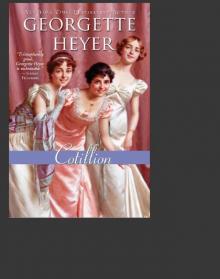 Cotillion
Cotillion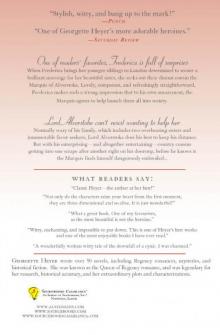 Frederica
Frederica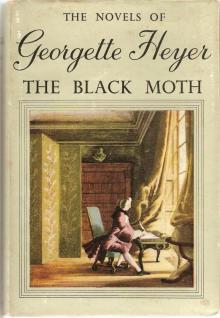 The Black Moth: A Romance of the XVIIIth Century
The Black Moth: A Romance of the XVIIIth Century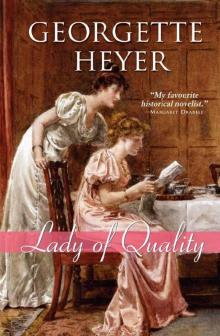 Lady of Quality
Lady of Quality Snowdrift and Other Stories
Snowdrift and Other Stories An Infamous Army
An Infamous Army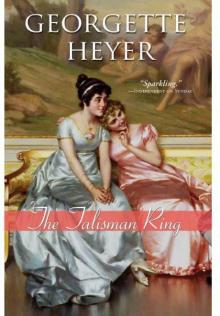 The Talisman Ring
The Talisman Ring Venetia
Venetia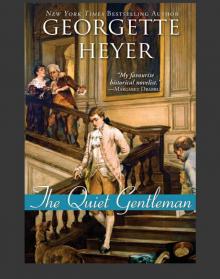 The Quiet Gentleman
The Quiet Gentleman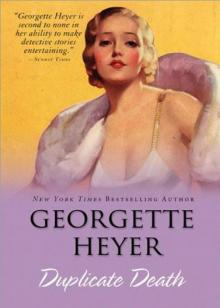 Duplicate Death
Duplicate Death Cousin Kate
Cousin Kate Black Sheep
Black Sheep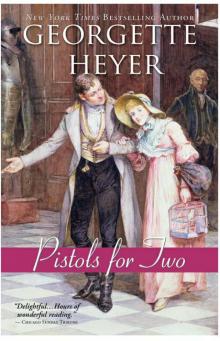 Pistols for Two
Pistols for Two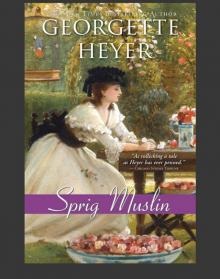 Sprig Muslin
Sprig Muslin No Wind of Blame
No Wind of Blame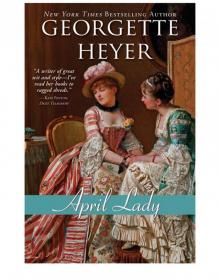 April Lady
April Lady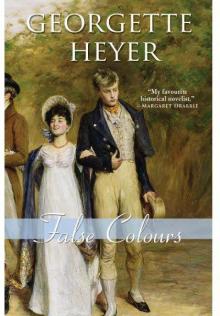 False Colours
False Colours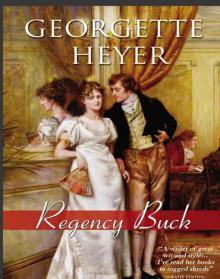 Regency Buck
Regency Buck The Toll-Gate
The Toll-Gate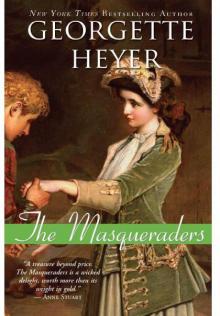 The Masqueraders
The Masqueraders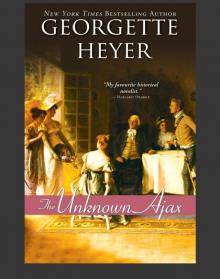 The Unknown Ajax
The Unknown Ajax The Grand Sophy
The Grand Sophy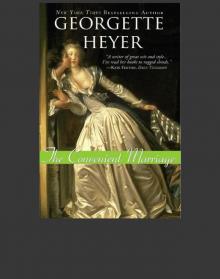 The Convenient Marriage
The Convenient Marriage Faro's Daughter
Faro's Daughter The Conqueror
The Conqueror The Foundling
The Foundling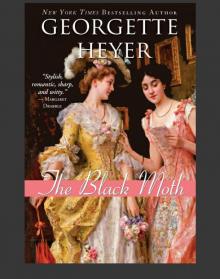 The Black Moth
The Black Moth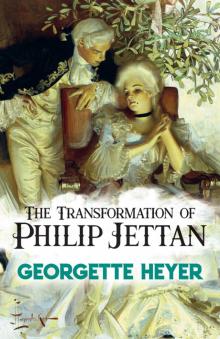 The Transformation of Philip Jettan
The Transformation of Philip Jettan Friday's Child
Friday's Child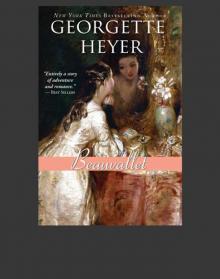 Beauvallet
Beauvallet They Found Him Dead
They Found Him Dead Charity Girl
Charity Girl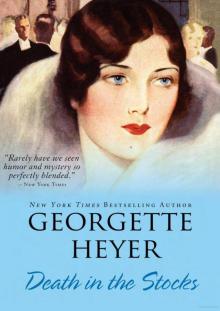 Death in the Stocks: Merely Murder
Death in the Stocks: Merely Murder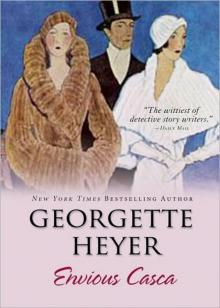 Envious Casca
Envious Casca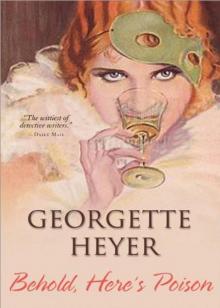 Behold, Here's Poison
Behold, Here's Poison Arabella
Arabella The Nonesuch
The Nonesuch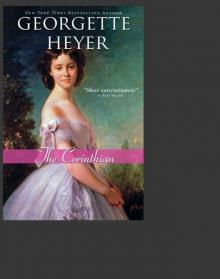 The Corinthian
The Corinthian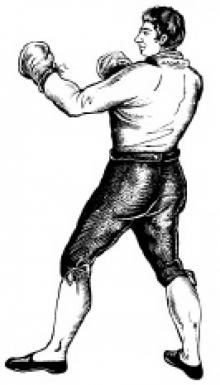 Jennifer Kloester
Jennifer Kloester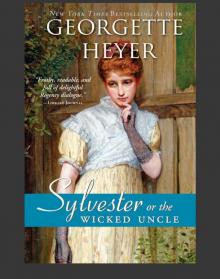 Sylvester
Sylvester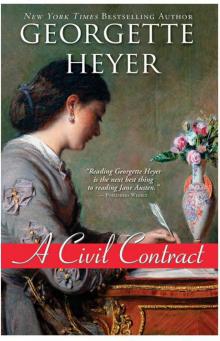 A Civil Contract
A Civil Contract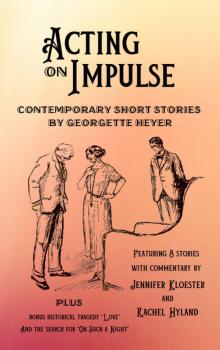 Acting on Impulse
Acting on Impulse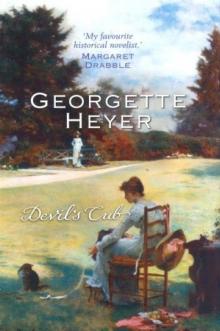 Devil’s Cub at-2
Devil’s Cub at-2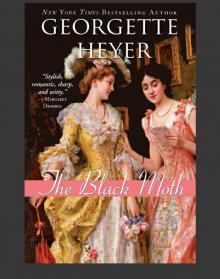 Black Moth
Black Moth Grand Sophy
Grand Sophy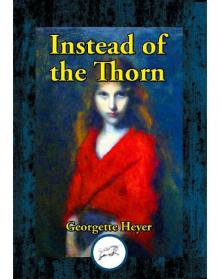 Instead of the Thorn
Instead of the Thorn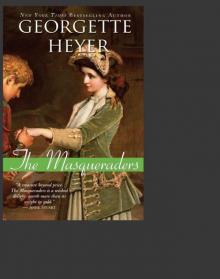 Masqueraders
Masqueraders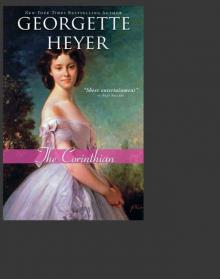 Corinthian
Corinthian Reluctant Widow
Reluctant Widow